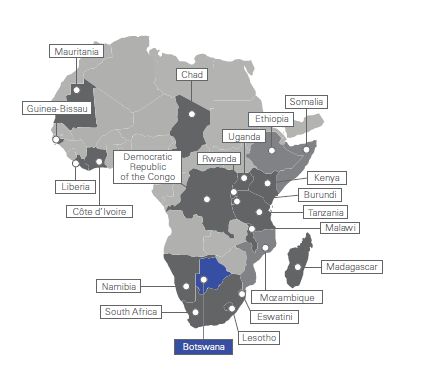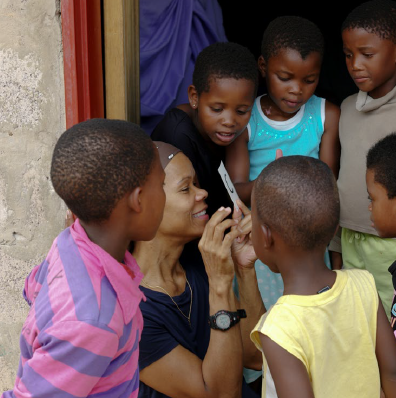Africa is on the move: the continent has some of the fastest-expanding economies in the world with a rapidly growing young population. Botswana is one such example, rich in natural resources, and has been a middle-income country for the past five decades. Progressive government spending on services enabled the country to significantly improve the quality of life for many of its 2.2 million citizens, including approximately 800,000 young people. Children and adolescents have enormous potential to transform their lives, contributing to country- and region-wide outcomes. Today, two policies – the National Vision 2036 and the National Development Plan (2017–2023) – recognize
that education is critical to unlocking a transformative demographic dividend that will help spread prosperity and make the economy knowledge-driven. With the right government policies, investments and strong technical support, Botswana’s children and adolescents can contribute to this national vision. Schools for Africa (SFA) is a global initiative, which aims to achieve quality education across sub-Saharan Africa, ensuring that all children, including the most remote and marginalized, are learning and gaining the skills to succeed in life and work. SFA convenes businesses, governments and individuals and has a proven track record in partnering with the private sector to achieve education results for children.
The challenges
Despite strong results in core education indicators, children from ‘deprived’ families – large, rural households headed by a female with low educational attainment and at least one family member who is HIV positive, disabled or both – are much less likely to be in school than their peers. Botswana’s education system is also marred by poor secondary to tertiary transition rates and a mismatch between skills and labour force needs. The following additional challenges must also be addressed:
• Early childhood education – children are not attending preschool programmes. In 2016, gross enrolment was 20 per cent;
• Out-of-school children – approximately 15 per cent of primary-school-age children were not in school between 2009 and 2013;
• Quality of learning – declining pass rates over a five-year period from 41 per cent in 2012 to 34 per cent in 20172 suggest that the quality of students moving into senior secondary and tertiary-level education is deteriorating;
• Outdated curriculum and teaching methods – appropriate curricula that teach vocational and life skills are needed to improve learning outcomes, life skills and employability;
• High HIV rates – National HIV prevalence (2013) among adolescents was the second highest globally, at 19 per cent;
• Violence against children persists – a 2012 survey indicated that 40 per cent of children aged 10–19 had experienced bullying; 25 per cent had been threatened or injured with a weapon; and nearly 13 per cent had been forced to have sex during the 12 months prior to the survey.
The Peter Krämers Foundartion`s and UNICEF’s response in Botswana
UNICEF Botswana works in partnership with the government on education and learning, resulting in:
increased access to and enrolment in early childhood development (ECD) programmes, a government-endorsed ECD Policy Framework in March 2018, and a communityled integrated ECD programme that targets caregivers/ parents and ECD teachers, strengthening their capacity to provide quality early childhood education. UNICEF supports ‘Out of School Education for Children’, helping to reach children in remote areas who have difficulty accessing school and staying enrolled. Together with the government, UNICEF is striving to make basic education accessible to all, regardless of their location, socio-economic status, cultural background or disability status.


